Champions of Change Blog
I Love You Too Much to Let You Fail: A Path to Transformational Change
Posted by on September 5, 2012 at 5:12 PM EDT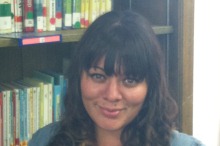 Vanessa Lugo is being honored as a Champion of Change for her service to education.
Vanessa Lugo is being honored as a Champion of Change for her service to education.
There are no words to adequately express how deeply honored I am to be receiving the Champions of Change award. As a Hispanic female, a child of immigrants, and an English language learner, I feel that my entire life I have been preparing to engage in this work in our community.
Upon graduating from UCLA in 2010, I entered the profession of teaching through Teach for America; an alternative licensure program founded by Wendy Kopp, whose mission is to place high achieving college graduates, as teachers in our highest need schools. I was placed as a bilingual educator, meaning I could be hired as anything from a Pre-K teacher to a high school Spanish teacher. I will never forget my first and only teaching interview with the staff at Cole Arts and Science Academy. It lasted for about fifteen minutes over Skype. It was the last question and my answer to that question that changed my life: Why should we hire you over anyone else? My response: I see myself reflected in the students that I will be teaching. I grew up in a low-income neighborhood and I received free lunch at school. My parents are immigrants from Mexico and when I began school they did not speak English and neither did I. I want to demonstrate to my students and families that—there are no limits to what they can accomplish. Querer es poder.Where there is a will, there is a way.
In my classroom grassroots transformational change has revolved around the idea that a student’s background and culture should be an asset in the classroom. It should never be considered a barrier to success. This mindset has illuminated my path in education both in and outside of the classroom. In my practice as a bilingual educator my belief is carried out in viewing and using my students’ and families’ native language as a sacred tool to learn English and in English. It has helped increase student engagement in my classroom by ensuring that the lessons I teach my students are reflective of who they are racially, culturally and linguistically. As a first year teacher, this began as simply making sure the classroom environment was representative of the students in our classroom as well as being intentional about the texts that I selected for our read aloud, making sure that they reflected my student’s cultures and their interests. When I saw how much more my students enjoyed the books that had characters that looked like them, I was motivated to make my curriculum student-centered. I began to design more learning experiences that affirmed the diversity within our classroom incorporating students’ native language, musical interests as well as favorite foods. In order for students to value and see their background and culture as an asset—we as educators MUST see our students’ cultures and backgrounds as assets.
Culture and background can only be seen as an asset when, as a nation we cease to look at our students and families of color from a deficit perspective. I have seen first hand the tragic effects of sympathy and excuses for why students cannot learn. I believe that this is part of the problem in our education system today. Sympathy and excuses must stop. As a nation we must come to terms with the fact that our kids and families do not need our sympathy. Let us vow to take an asset-based perspective, seeing our students and families for who they are: strong, intelligent, and capable human beings with rich, vast, and varied life experiences. In my time as an educator and my lifetime as a student I have found that the key to success in school lies in building solid, positive relationships with students, families, caretakers and the community at large and maintaining high expectations for all regardless of circumstance. Our students and families need to know that we love them too much to let them fail, the future of our nation depends on this. To do this, we must know who our students are and what their hopes and dreams are because if we cannot motivate them and inspire them, how do we expect to teach them?
Outside of the classroom my work in education has revolved around systemic transformational change, in the realm of teacher education and support. As a Teach for America corps member I felt that the program’s programming around diversity, community and achievement left much to be desired especially since the students we were about to teach were children of color. As a result, I have spent the last two years working with Teach for America to increase corps members understanding of our students of color and our English language learners. This past summer I worked as a corps member advisor, partnering with twelve promising new teachers from Hawaii, Northeast Ohio, Indianapolis, Colorado, New Mexico, and Phoenix to support them in developing the skills they will need to feel prepared to enter their classroom this fall. Additionally, I worked closely with an amazing team of our fourteen staff members charged with the task of facilitating a series of sessions on diversity, community and achievement. The sessions explored topics of race, class and real and perceived lines of differences, all topics that are pertinent to both new and current teachers in the landscape of our public schools.
In my work, my goal is to be more than a mouthpiece for those who often feel powerless—my goal is to empower them so that they feel the confidence and exuberance to share their stories, their hopes, and their dreams.
Vanessa Lugo is a teacher at Cole Arts and Science Academy in Denver Public Schools
Learn more about EducationPreparing Students for College Early
Posted by on September 5, 2012 at 4:52 PM EDT Jesus Arrizon is being honored as a Champion of Change for his service to education.
Jesus Arrizon is being honored as a Champion of Change for his service to education.
I am deeply honored to represent my community of San Luis, Arizona, and the Gadsden Elementary School District 32, as a White House Champion of Change. Our students face numerous challenges that include living in a predominantly Hispanic border community stricken by poverty, limited English language exposure, high unemployment rate, and the lack of a culturally diverse population. Nevertheless, I believe that we have risen to the occasion by creatively developing programs that prepare our students with the necessary skills to succeed in college. For example, one of the programs I am involved with allows our children to embark on a college degree at the beginning of 7th grade. Our school district, partners with our local community college, to offer college-level mathematics courses. These children have the opportunity to complete College Calculus I before they transfer to high school. This program gives students the competitive edge needed to succeed in our global economy.
Students, parents, school board members, and our community college, work collaboratively to ensure the success of these students. Those who successfully complete the first course are allowed to enroll in the next college-level course, with the goal of completing a two-year college degree by the end of their senior year of high school.
Those participants who are enrolled in advanced college mathematics are concurrently enrolled in an American College Test (ACT) Preparatory class at our junior high school. The students achieving a passing score in the ACT test participate in rigorous academic courses offered through the Center for Talented Youth Program at Johns Hopkins University, at five major sites across the nation. At these sites, they take courses such as: Principles of Engineering Design, Chemistry in Society, Nuclear Science, Anatomy and Physiology, Volcanoes, Paleontology, Philosophy, among others. Many of the students who participated in the first cohort have been accepted to institutions not only in Arizona, but across the U.S. They have been awarded scholarships to attend highly selective universities such as the Massachusetts Institute of Technology (MIT), the University of California at Berkeley, Duke University, Rochester University, the University of Arizona, and Arizona State University. Furthermore, our students have attended summer programs at The Barrett Summer Scholar’s Program at Arizona State University, MIT, Harvard University, University of California, Bristol University, and Seattle University.
This program provides a lifetime opportunity for our students from San Luis, Arizona, enabling them to leave their community to expose and interact with other students from other cultures and to experience life outside of their border town allowing them to see life from a different perspective. Upon their return from these summer camps, they embrace their own ethnicity infusing them with a profound thirst for academic success and competiveness.
It is however the students who have been diligently studying and preparing for the rigors of this program, the students’ parents who have worked very closely with me tirelessly to ensure that their kids participate in class, tutoring, and other extracurricular activities. I humbly accept this honor, but I would like to congratulate my students and their families as well, as they are the true Champions of Change.
Jesus Arrizon is a teacher at Gadsden Elementary School and professor at Arizona Western College
Learn more about EducationTeaching Is a Gift, Not a Job
Posted by on September 5, 2012 at 4:41 PM EDT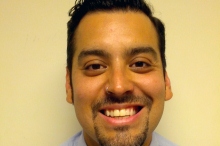 Raul Garcia is being honored as a Champion of Change for his service to education.
Raul Garcia is being honored as a Champion of Change for his service to education.
I am deeply humbled and grateful for being named a Champion of Change. Teachers go to work every day to transform and inspire young people and I am so lucky to work with colleagues, families, and young people who drive my passion for the classroom with each waking morning. I genuinely believe that teaching is a calling and students know when their school community cares about them and works tirelessly to shape their minds and provide them with skills to survive the ever changing world around them. After 15 years of teaching in the Boston Public Schools I still wake up every day eager, and even giddy, to take on this challenge and calling.
The Boston Arts Academy, where I have worked for the past eleven years, has provided me with countless opportunities to become an innovative teacher, leader, and thinker in the classroom. As a small pilot school we have been afforded the luxury of having certain autonomies which allow teachers and leaders in our school to design curricula and staff that meet the needs of students and the greater mission of our school. One of those autonomies is the freedom to develop innovative curricula, while still adhering to state standards. This has allowed my colleagues and I in the Humanities Team to build a curricula over the past 15 years that is constantly shifting to meet our student population’s needs and to insure that we, as a team, refresh and raise our own standards every year. Whether we are revamping our literature schema or strengthening our Open Honors program the process is always empowering since all decisions are both collaborative and completely engaged through rich dialogue. Teaching at the Boston Arts Academy represents a team of educators committed to providing a rigorous arts and academic education for our urban students through a thoughtful and open process that we model all year for our kids.
While at B.A.A. I have also redesigned the 10th grade writing team’s curricula along with another group of colleagues in order to address student interests with regards to literacy, while also providing a rigorous writing program that prepares students for the state exam. This has been a wonderful design process for the last decade because with each year we have to reconsider ELL needs, Special Education needs, and even shifting race, class, and gender demographics in order to fit the most appropriate and challenging program for our students. With each year, and even student grouping, we find ourselves selecting novels, short stories, poems or even reading and writing skills to meet the specific needs of our students. Inspiring and motivating students is a constant moving ship and our teachers understand that if we are to be successful with our kids we must ask hard questions, think deeply about who our students are, and design, every day, curricula that is both demanding and exciting. Our job is to make our students love to read and write, not to just teach reading and writing. Teaching this to young adults is a labor of love because we are responsible for developing life-long readers and writers and this task is not taken lightly by my team.
In recent years I have also revived the National Honors Society at our campus and created a culture of service that has spread our work from the streets of Boston to as far away as the Grand Canyon. As a teacher it was always a goal of mine to have students understand the power of service and working in the communities that surround them. During my leadership of N.H.S. we required students to create their own community service plan outside of the school in Boston’s different neighborhoods, innovating unique fundraising strategies, and to save every year to travel to different states in order to serve their fellow Americans in need. Whether engaged in conservation work in Arizona, rebuilding after Hurricane Katrina, or assisting teams in Chicago’s urban gardens, students all learned that they are part of a much greater society than they ever imagined. Seeing students return home from their service trips is always a great joy of mine because, unlike the classroom, you have the unique opportunity of watching them “try on” their ideas in the real world. Being able to develop a sense of responsibility to their country in our urban youth is absolutely critical and a deep passion of mine that I relish each school year.
Again, B.A.A. has created a school environment that has empowered me as an educator and member of Boston’s many communities. When I walk to work every day I see and feel my responsibility to my students each day. I am very proud of the work we have done at the Arts Academy and I am confident that our students are making our country a better society because of the education they receive every day from us.
Raul Garcia teaches Writing and Humanities at the Boston Arts Academy
Learn more about EducationThere Is No Teaching Without Learning
Posted by on September 5, 2012 at 4:27 PM EDT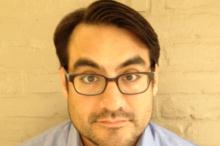 Ben Hernandez is being honored as a Champion of Change for his service to education.
Ben Hernandez is being honored as a Champion of Change for his service to education.
Through 14 years of service in the Houston Independent School District (HISD) I have learned to maintain one doctrine. Simply stated it is that there is no teaching without learning. I cannot say I am a teacher if students are not learning. This credo drove me through my lessons in the classroom, kept me up late planning and preparing, pushed me to ensure my students met my high expectations. My work was defined by learning. And my students learned. However, I soon realized that my students' learning was only part of the equation. I realized I had to be a part of that learning as well.
There is no teaching without learning and as a teacher I had to also be a student. After teaching elementary PE for 4 years, I transitioned into teaching kindergarten. As a kindergarten teacher I learned a tremendous amount. For five years I was a student in that room learning about workstations, phonemic awareness, developing number concepts, one-to-one correspondence, and of course routines routines routines. I often say that it was in the kindergarten classroom where I learned to teach. After 5 years as a kinder teacher I became a 5th grade math teacher. Though it was those 5-year-olds that taught me, it was with my 5th graders that I had the most success. As a 5th grade teacher my students soared. My instruction resulted in my students outperforming the 5th grade students of previous years and previous teachers on the state standardized assessment. Fifth grade math passing percentage increased from 76% to 95% in my first year alone. The following four years my students demonstrated similar achievement ranging from 95% to 100% passing. This dramatic growth in math resulted in my school receiving a Blue Ribbon Award for significant gains in math achievement. And yet, I attribute my success as a 5th grade teacher to my continued learning and constant development. Again, without learning there could not have been any teaching.
Understanding that the key to effective teaching was learning I made the tremendously difficult decision last year to move out of the classroom and into professional development. Because of my success as a teacher, I felt it incumbent upon me to teach other teachers. In my working with HISD leadership to create a new appraisal and development system a new role in professional development was born. This new role was given the name of Teacher Development Specialist (TDS). The job of the TDS is to observe teachers and provide meaningful (non-evaluative) feedback for the purpose of improving instruction. This was a major shift in the work of professional development in our district. The TDS is to provide job embedded professional development targeted directly at instruction and tailored to fit individual teachers.
My move into the TDS position has allowed me to impact many more students in HISD by working with teachers to improve their instruction. There is no teaching without learning. And now after 13 years of teaching elementary students, I have the charge of teaching teachers
Ben Hernandez works in Professional Support and Development for teacher instruction
Learn more about EducationObstacle Can Become An Opportunity
Posted by on September 5, 2012 at 4:14 PM EDT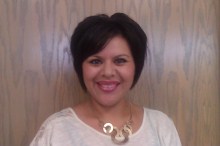 Guadalupe Meza is being honored as a Champion of Change for her service to education.
Guadalupe Meza is being honored as a Champion of Change for her service to education.
I am truly honored, privileged and blessed to be named a White House Champion of Change. This recognition is not only for me but for all my colleagues that dedicate their life, enthusiasm and energy to give the best to our students. Additionally this is dedicated to ALL the students that I have taught from 2006 to the present. It is unbelievable to think that I have impacted students’ lives in a way that even after they graduated they came to visit me or have some type of communication. I don’t only work with my students but with the school as a whole, district and community. I never imagined I would get this type of recognition by doing what I love - teaching and helping those in need.
I began my perpetual pursuit of knowledge seven years ago. I always knew I wanted to be a teacher, not just a teacher, but someone who can make a difference in a student’s life. I had to be realistic and I am very down to earth, so I realized that I cannot change everybody, but I can give my students the tools to succeed. They decide if they want to take them or not. I am goal oriented, motivated, passionate, caring, committed and diligent. I am a truly believer that any obstacle can become an opportunity.
I am part of several extracurricular activities. I am a co-sponsor of South Mountain High School’s M.E.Ch.A. (Movimiento Estudiantil Chicanos de Aztlan) and L.U.L.A.C. (League of United Latin American Citizens) clubs. I am also co-advisor of the Spanish Honor Society. As the sponsor of these clubs, I can give South Mountain High School students the opportunity to participate in the Dia de los Muertos Competition and attend the annual Cesar E. Chavez assembly. Moreover, I collaborate with S.B.A.T.S. 11, the high school from Phoenix’s sister city in Hermosillo, Sonora, in Mexico and the International Magnet Program at my alma mater, Central High, to bring La Rondalla to the South Mountain Community every January.
As one of my colleagues said, I have a strong rapport with the school administration and our broader community. I proudly marched along with South students and their families when they gathered to right a wrong and make their voices heard against a state law that they did not support. I help my students find scholarships especially those that cannot ask for financial aid. I like to serve my school and community well. Another one of my interest is helping students at risk; for this reason I took a local campus passion, handball, and elevated it from an activity to engage in while ditching class, to an organized, sponsored team who practice afterschool. These new Jaguar athletes compete against other teams in Phoenix, Tucson and the other parts of the southwest. Some would have dropped out of high school, but instead come to school so they can be on the handball team. I think everybody deserves an opportunity and having someone who believes in these students or just giving a little push is enough so they can fly high and achieve more than they imagined. Being a teacher is the best choice I ever made, I am a millionaire with all the knowledge I have acquired throughout the years and I am very thankful for all the students that have contributed to my career.
Guadalupe Meza is a Spanish Educator at South Mountain High School in Phoenix, Arizona
Learn more about EducationPreparing Young Minds for Challenge
Posted by on September 5, 2012 at 3:52 PM EDT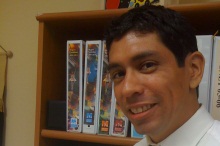 Armando Orduña is being honored as a Champion of Change for his service to education.
Armando Orduña is being honored as a Champion of Change for his service to education.
I come from a region of the country filled with great pride; pride in our industries, our food, our music, our innovations. It has been my career-long attempt to reflect that tradition of pride in my life through our children. I did not consciously choose to serve my community through public education but like so many others was called to it.
My father immigrated to Houston from his home country of Mexico in search of opportunity. He came to work. My mother came to Houston from her small, Texas coastal town for opportunity, as well. She came to work. When they found each other, they found their own piece of the American Dream. Together they founded a family. In that family, they found purpose. Through their work, their children found purpose.
Through my work with young people, I see my own purpose mirrored in their eyes. In my early efforts in community outreach, I delivered early childhood literacy and math programming to eager minds unable to cross city and social boundaries for themselves. In later years, I welcomed these same children as older students into my classroom to scaffold their learning as they proceeded toward their next level of knowledge and understanding. As I travel through the streets of my city, I view the opportunities that lay before them in the form of badly needed transformation and reform. This inspires me with much hope as I see my own purpose in equipping these young minds for the great challenges that lay ahead.
And through it all, I remind myself, these great accomplishments yet to come, were contributed to by the love of two hopeful individuals; two people in love with each other and purpose.
Armando Orduña trains high school students for careers in Education through the only teacher-preparation magnet program in Houston, Texas
Learn more about Education
- &lsaquo previous
- …
- 92
- 93
- 94
- 95
- 96
- 97
- 98
- 99
- 100
- …
- next &rsaquo
White House Blogs
- The White House Blog
- Middle Class Task Force
- Council of Economic Advisers
- Council on Environmental Quality
- Council on Women and Girls
- Office of Intergovernmental Affairs
- Office of Management and Budget
- Office of Public Engagement
- Office of Science & Tech Policy
- Office of Urban Affairs
- Open Government
- Faith and Neighborhood Partnerships
- Social Innovation and Civic Participation
- US Trade Representative
- Office National Drug Control Policy
categories
- AIDS Policy
- Alaska
- Blueprint for an America Built to Last
- Budget
- Civil Rights
- Defense
- Disabilities
- Economy
- Education
- Energy and Environment
- Equal Pay
- Ethics
- Faith Based
- Fiscal Responsibility
- Foreign Policy
- Grab Bag
- Health Care
- Homeland Security
- Immigration
- Innovation Fellows
- Inside the White House
- Middle Class Security
- Open Government
- Poverty
- Rural
- Seniors and Social Security
- Service
- Social Innovation
- State of the Union
- Taxes
- Technology
- Urban Policy
- Veterans
- Violence Prevention
- White House Internships
- Women
- Working Families
- Additional Issues

